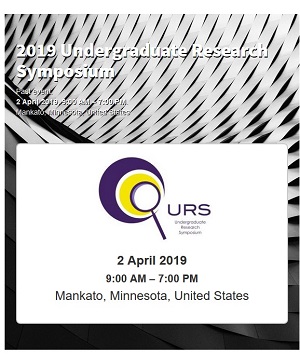The Influence of Electronic Health Record (EHR) Training on the Technostress, Job Satisfaction and Performance among Clinical Dietitians
Location
CSU Ballroom
Start Date
2-4-2019 10:00 AM
End Date
2-4-2019 11:30 AM
Student's Major
Computer Information Science
Student's College
Science, Engineering and Technology
Mentor's Name
Sarah Kruse
Mentor's Department
Computer Information Science
Mentor's College
Science, Engineering and Technology
Description
Through the American Recovery and Reinvestment Act, Electronic Health Records (EHR) implementation and demonstration of its “meaningful use” became required for all health care providers as of January 1, 2015 with a goal to improve the patient's quality of care while also increasing work efficiency and health data accessibility. Previous research has shown that physicians who use EHR systems experience low job satisfaction, productivity and have high risk for professional burnout due to technostress. The previous research was mainly focused on physicians whereas we are interested in understanding the effects of technology use among dietitians. We are still finalizing our data collection phase. However, the anticipated findings include, but not limited to, recognizing the most significant factors/predictors of the technostress levels, understand the current available EHR trainings and their effectiveness, suggest the alternative ways to mitigate the technostress and help practicing dietitians be successful with technology use. The data collection is administered through an online anonymous survey designed and implemented in Qualtrics. Once the complete dataset is obtained, the data will be analyzed using R and R Studio software. The preliminary analysis will include descriptive statistics and exploratory data analysis in order to identify the data properties and ensure all the necessary assumptions are met before proceeding to the hypothesis testing. The statistical tests may include parametric and/or non-parametric tests which depends on the population distribution assumptions obtained in the exploratory phase.
The Influence of Electronic Health Record (EHR) Training on the Technostress, Job Satisfaction and Performance among Clinical Dietitians
CSU Ballroom
Through the American Recovery and Reinvestment Act, Electronic Health Records (EHR) implementation and demonstration of its “meaningful use” became required for all health care providers as of January 1, 2015 with a goal to improve the patient's quality of care while also increasing work efficiency and health data accessibility. Previous research has shown that physicians who use EHR systems experience low job satisfaction, productivity and have high risk for professional burnout due to technostress. The previous research was mainly focused on physicians whereas we are interested in understanding the effects of technology use among dietitians. We are still finalizing our data collection phase. However, the anticipated findings include, but not limited to, recognizing the most significant factors/predictors of the technostress levels, understand the current available EHR trainings and their effectiveness, suggest the alternative ways to mitigate the technostress and help practicing dietitians be successful with technology use. The data collection is administered through an online anonymous survey designed and implemented in Qualtrics. Once the complete dataset is obtained, the data will be analyzed using R and R Studio software. The preliminary analysis will include descriptive statistics and exploratory data analysis in order to identify the data properties and ensure all the necessary assumptions are met before proceeding to the hypothesis testing. The statistical tests may include parametric and/or non-parametric tests which depends on the population distribution assumptions obtained in the exploratory phase.
Recommended Citation
Konatar, Ana. "The Influence of Electronic Health Record (EHR) Training on the Technostress, Job Satisfaction and Performance among Clinical Dietitians." Undergraduate Research Symposium, Mankato, MN, April 2, 2019.
https://cornerstone.lib.mnsu.edu/urs/2019/poster-session-A/36




